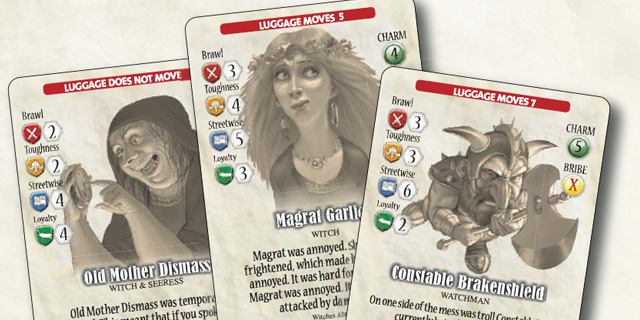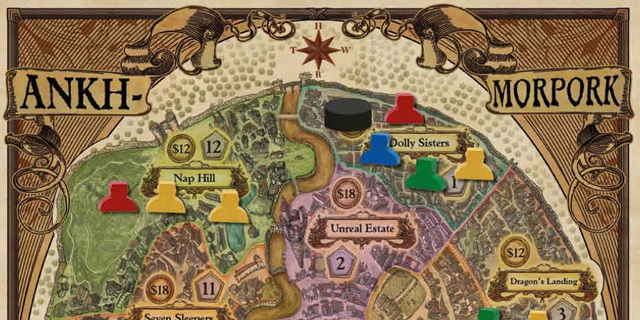
One of my non-gaming passions is Terry Pratchett’s Discworld novels and other writings. I own over forty of his books (most of which I’ve read multiple times), two animated adaptations, three BBCTV movie adaptations, and even a couple of point-and-click computer games (although I still need to give Discworld Noir a try…). So when I learned of not one, but two Discworld board games coming out this year to say I was thrilled would be a gross understatement.
The two games — Guards! Guards! (designed by Leonard Boyd and David Bradshaw, published by Z-Man Games) and Ankh-Morpork (designed by Martin Wallace and published by Mayfair) — could not be more different, and I wanted to present my impressions of both.
Guards! Guards! is a madcap collection race through the winding streets of Ankh-Morpork, the city in which the majority of the novels take place. From two to six players are tasked with retrieving five of the Eight Great Spells that have somehow become scattered across the city. Along the way they will have to recruit a wide array of Discworld characters, either by charm or via bribery, as volunteers to assist them in their mission. Items and spell scrolls can be also purchased along the way to help, but they will have to fend off opposing volunteers (saboteurs), five magical challenges, the pox, a homicidal semi-sentient Luggage, random acts of Fate, and even a dragon or four in order to succeed. Even with all of that, the biggest obstacle to success will probably be the eight-sided die that carries a one-in-eight chance of unconditional failure on just about every task. Of course, that’s even assuming that players can penetrate the ambiguous and hole-riddled rules in the first place.

Ankh-Morpork, by contrast, is a much more streamlined and traditional Eurogame, as might be assumed given the pedigree of its designer. From two to four players each have a secret win condition and will vie for control of the titular city’s twelve districts en route to achieving it. All actions are performed via cards representing various Ankh-Morpork personalities bearing one or more action symbols and possibly some special text; each player has to play at least one card per turn (although all potential actions are optional save one), which gives the game a built-in timer as exhausting the deck will end the game if no players have achieved their personal win condition (although one of the potential win conditions is to exhaust the deck). Aside from the cards themselves, the only randomness inherent to the game are specific cards that bear the one non-optional action symbol, which triggers an event that affects one or more of the districts via rolling a twelve-sided die.
As you might have guessed, I prefer Ankh-Morpork to Guards! Guards!, although each game has its own merits. Guards! Guards! is a more social game, filled with backstabbing, chaos, and other insanity. Players are constantly interfering in each other’s actions if everyone is playing correctly. Sadly, the rules need a serious overhaul and/or an in-depth FAQ, and might be too complicated for casual gamers even then, but the creators are active on the game’s BGG forums and are happy to clarify whenever they can. The other major problem with Guards! Guards! is the length of play, with an average game taking around two hours to complete; by the time players have reached the end of the game patience might be wearing quite thin. The game seems to be aiming for a very specific type of audience, and I’m not sure of these non-casual social gamers exist in enough numbers to give the game a decent chance, and even being Discworld fans might not be enough. What Guards! Guards! does well enough is to capture the essence of Pratchett’s novels, especially the earlier ones. Each card also contains an excerpt from one of the books relating to the depicted character and an illustration by Stephen Player, who has done several works for Pratchett in the past and clearly knows the characters.

While Guards! Guards! includes actual Pratchett text for flavor, in my opinion Ankh-Morpork does a better job of actually representing those characters, and not just because the illustrations are in color. Each card’s actions make sense if you know the character involved (even the districts’ powers are accurate if you know enough about Ankh-Morpork): assassins assassinate, merchants generate cash, watchmen eliminate trouble, and the fact that the unavoidable random events only appear on cards depicting wizards from Unseen University is highly appropriate. The game captures more of the political intrigue elements of many the more recent novels, right down to the hidden motives of the players (themselves representing a specific Ankh-Morpork personalities, including Sam Vimes and Lord Vetinari). If there’s a noticeable flaw to the game, it is the tendency for seasoned players to default to a strategy of “prevent defense,” never allowing opponents to achieve any of the possible win conditions, which only serves to make the Sam Vimes win condition (exhaust the deck) a near certainty (if present), as it is the only one that cannot be prevented through active play. The other win conditions only trigger on the beginning of that player’s turn, which makes maintaining them difficult at best, especially in four-player games; you almost have to overshoot your target and hope that none of the other players possess enough of the correct cards to disrupt you.
Ultimately, which game is best for you will depend on your gaming group. Social groups who don’t mind having to sift through and/or interpret the rules will probably be able to get the most enjoyment out of Guards! Guards!, while strategy-oriented groups (like mine) will undoubtedly prefer the Martin Wallace design of Ankh-Morpork. Each game retails for around $50.



















